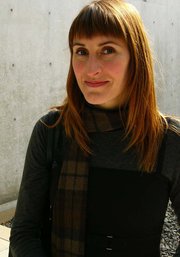Poems by Judith Bishop

14 Weeks
When you began, it was whether or not,
a daily rhythm in my heart,
but now the burgeoning kicks in and spins
your opening phrases out
into the weather of these waters,
where the skeins of inner sun
are a sunset through the skin
& dancing fronds resemble coral
round the bubble of your sac & your
hands attempt to close
on nubs that stray into their grasp & your
mouth wants to suck
the thumbs that swim under its arch ––
taking, testing, small philosopher,
materialist of mine, with a focus never known
once in possession of a mind.
First Words
Sooner or later it comes, the word for sky.
After moon and after stars, which decorate it,
the ground, which was up to then — or was it —
quite invisible. Now I talk about the sky to her
as if it were a bowl,
or a cloth draped above our heads
to shade us; now I paint it into being,
teach my daughter the solidity
of sky, though I know it in my heart
to be scatter, that particulate
blue. Things drop
from the sky: from my desk in a tower
I watched a flock of feathers
rock-rocking
on their journey to the pavement. One of them
was pink. Something happened in the sky
whose aftermath drizzled
through a minute of the morning, tugging
my attention;
then the sky clearing,
as if it were a synonym for peace.
Poet, Painter
(for Gloria Petyarre)
There should be a right distance,
at which
we would meet
if we could.
The sky
would pool in our hands,
the mark-making
fingers feel the infinite
diffractions
of a shared
light
–– our aftermarks
diverging then, yearning
for infinity, blind as
worms but with an instinct
for where the earth
dreams.
Tunings
The thought of a leaf –– unhitched,
unmoored, steered only by the air ––
comes at a meeting in which the men describe
self-driven cars
as the imminent future,
directed, if at all, by the air of our voices.
Somewhere in the deserts
of America, they say, unmanned cars
already drive into valleys, tuned
to the whispering of satellites.
One of them jokes, Just a few
of their crash dummy passengers survive.
Out of the meeting and back to the leaf.
It had no dream of losing steerage of itself ––
but was one day
relinquished by the tree.
Snow
(Anatole Mallarmé, 1871–1879)
Lamplight, shed on snow, is not itself,
not pure or plummet,
but it refracts to colour. It is self-divided.
A girl’s a red hand-shadow, meadow flowers
trapped in moonlight cast
an arched and azure double,
but if death is technicolour, restored
to black or white,
our shadows stamp our exile from the dead.
— Once there was a man. There was a son,
a youthful Icarus,
he kept with him in flight
as he orbited Ideas among the word-balloons
which freighted them.
The boy’s heart grew enlarged,
became a counterweight to all
his father sought
to elevate in phrases spoken and unspoken
by the son, king of the Work,
his shadow falling
on the page: a white flower,
that asks to be remembered by
the now-departed sun.
Edited by Pam Brown